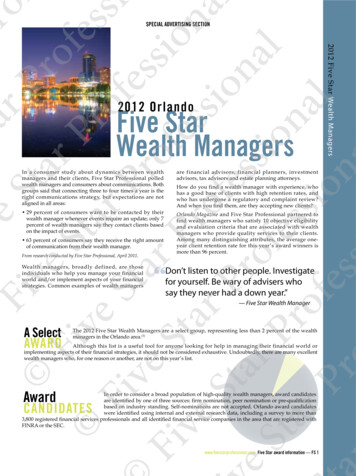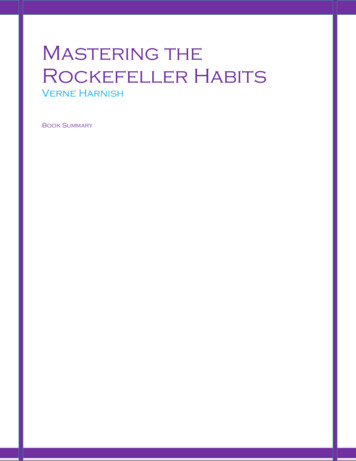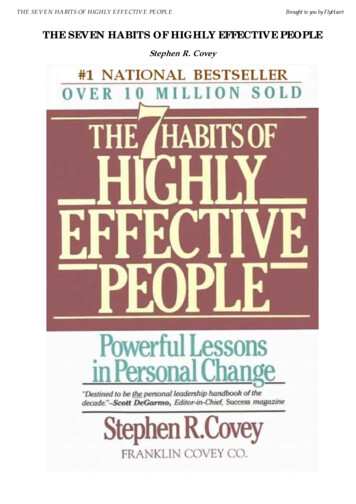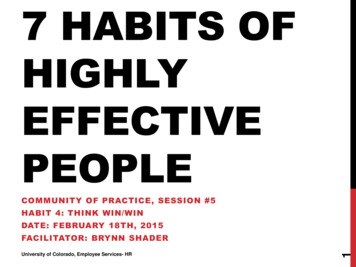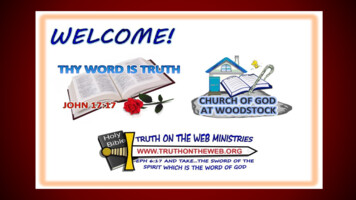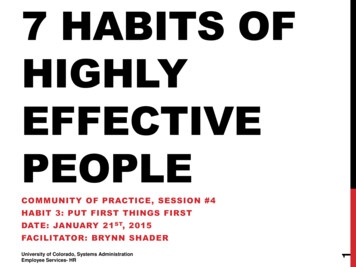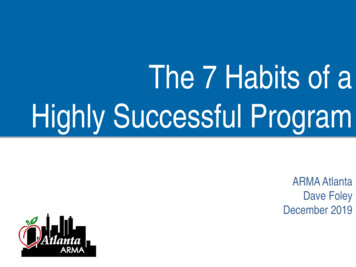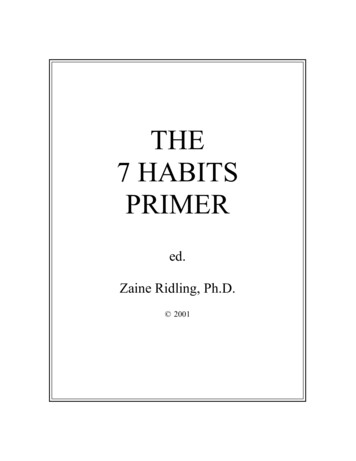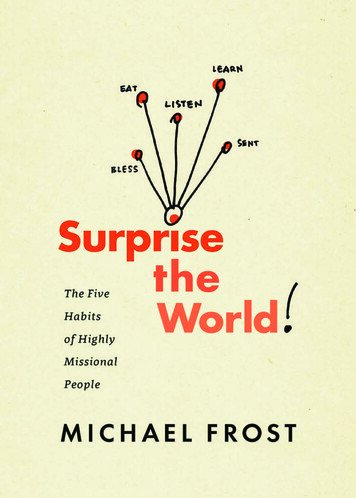
Transcription
Michael Frost has done it again, as he continues to raisethe temperature for missional living. In Surprise theWorld: The Five Habits of Highly Missional People, Frostgives us a memorable strategy that we each can put intopractice every day. You’ll want to get multiple copies toshare with your team to ensure that each one of us isprepared to live on mission to help even more peoplefind their way back to God.DAVE FERGUSONLead pastor of Community Christian ChurchEven after people read multiple books, they often ask,“So what does being missional really look like?” One ofmy answers is to go practice Mike Frost’s BELLS. Mikehas simplified the way of Jesus for our world today.Grab some friends, commit, and watch the kingdombecome tangible.HUGH HALTERAuthor of Brimstone, Flesh, and The Tangible KingdomSurprise the World is Mike Frost’s missional genius madeaccessible for the average person. So many lives willchange as a result, as people hear about and follow Jesus.DAN KIMBALLPastor, Vintage Faith Church
Michael Frost’s insights have made him a leadingvoice in the missional church movement. The habitscommended in Surprise the World will only cementMichael’s place as an original thinker who envisionsand serves those of us who are pastors and leaders inchurches. I will enthusiastically commend this bookto the churches for whom I am bishop, and I willmake use of it to train Holy Trinity Church, whereI am pastor.BISHOP TODD HUNTERThe Anglican Church in North AmericaA core part of the gospel is that Jesus came from thecomfort of heaven to a dark and broken world inorder to rescue humankind. If we’re to see anotherawakening in America, Christ followers will need tobe intentional about obeying the Great Commissionto “go and make disciples.” In Surprise the World,Michael Frost does an excellent job of explaining howto intentionally establish habits to share God’s lovewith the people around us.GERARD LONGFounder, Awakening to Love Ministries
Christians should be different: We should challengeconvention and stand out from culture. Too often westand out for the wrong reasons. In Surprise the WorldMichael Frost challenges us to lead lives that causethe world to question how we love and serve so well.This book is a timely wake-up call for believers and aconcise and helpful encouragement to those seekingto live on-mission in their communities. Mike is thereal deal and so is this book!ED STETZERwww.edstetzer.comIn this brief but powerful book, Michael suggestssimple, missional practices that can be applied in anycontext. He maps a way forward that demonstrateshow small gatherings of friends can help one anotherlive into these practices. If every follower of Jesusdeveloped a lifestyle that included these five habits,I’m convinced that a great spiritual awakening wouldtake place in the neighborhoods, towns, and cities ofour world.AL ENGLERMission director, Nav Neighbors
Eminently doable, entirely practical, and exceptionallyeffective! In Surprise the World, renowned missiologistMichael Frost creates a compelling vision of whathappens when a group of Jesus followers put intopractice five proven habits of missional living. Youwant to see your community reached with the GoodNews? Get your church to read this outstanding book!FELICITY DALEAuthor of An Army of Ordinary People
The Five Habits of Highly Missional PeopleM I C H AE L F ROS TA NavPress resource published in alliancewith Tyndale House Publishers, Inc.
NavPress is the publishing ministry of The Navigators, an internationalChristian organization and leader in personal spiritual development.NavPress is committed to helping people grow spiritually and enjoy livesof meaning and hope through personal and group resources that arebiblically rooted, culturally relevant, and highly practical.For more information, visit www.NavPress.com.Surprise the World: The Five Habits of Highly Missional PeopleCopyright 2016 by Michael Frost. All rights reserved.A NavPress resource published in alliance with Tyndale House Publishers, Inc.NAVPRESS and the NAVPRESS logo are registered trademarks of NavPress,The Navigators, Colorado Springs, CO. TYNDALE is a registered trademark ofTyndale House Publishers, Inc. Absence of in connection with marks of NavPressor other parties does not indicate an absence of registration of those marks.Cover design by Jen PhelpsThe Team:Don Pape, PublisherDavid Zimmerman, Acquiring Editor, Development Editor, CopyeditorAll Scripture quotations, unless otherwise marked, are taken from the Holy Bible, NewInternational Version, NIV. Copyright 1973, 1978, 1984, 2011 by Biblica, Inc. Used by permission. All rights reserved worldwide.Scripture quotations marked ESV are taken from The Holy Bible, English StandardVersion (ESV ), copyright 2001 by Crossway, a publishing ministry of Good NewsPublishers. Used by permission. All rights reserved.Some of the anecdotal illustrations in this book are true to life and are included withthe permission of the persons involved. All other illustrations are composites of realsituations, and any resemblance to people living or dead is coincidental.Library of Congress Cataloging-in-Publication DataFrost, Michael, date.Surprise the world : the five habits of highly missional people / Michael Frost.pages cmISBN 978-1-63146-516-11. Missions. 2. Evangelistic work. 3. Witness bearing (Christianity) I. Title.BV2063.F76 2016266—dc232015033534Printed in the United States of America22 21 20 19 18 17 167654321
CONTENTSIntroduction ixChapter 1 Living “Questionable” Lives 1Chapter 2 A New Set of Habits 17Chapter 3Bless: The First Habit 29Chapter 4 Eat: The Second Habit 41Chapter 5 Listen: The Third Habit 57Chapter 6 Learn: The Fourth Habit 71Chapter 7 Sent: The Fifth Habit 85Chapter 8 Discipleship, Nurture, and Accountability 99The BELLS Challenge: DNA Accountability Form 105Questions for Discussion and Engagement 109Appendix: Resources for Learning Jesus 117Notes 121About the Author 125
INTRODUCTION I really didn’t set out to create an international movement.When I came up with the BELLS model described inthis book, I thought it was just a simple idea our churchcould adopt to foster missional habits in our lives. I hadno idea that churches right across the world— the UnitedStates, Canada, the United Kingdom, New Zealand, andgoodness knows where else— would embrace it. But nowit seems that everywhere I go I meet folks who tell methey are living out these five simple habits in an attemptto better fulfill the mission of God.I partly blame my good friend Alan Hirsch. He regularly mentions BELLS in his lectures and seminars asan example of how churches can encourage missionalliving within their members. Although I have outlinedthe model in a couple of my earlier books, I have tendedto be more coy about BELLS, preferring to encourageix
S U R P R I S E T H E WO R L Dchurches to create their own homegrown approach tomissional living rather than expecting them to simplyadopt our model.But when recently the folks at the Exponential churchplanting movement asked me to write a manual onhow to do BELLS, I figured it was time to abandon mydiffidence and go ahead and fly the flag. So the bookyou’re holding was originally an e- book posted on theExponential site. I was delighted when NavPress thenexpressed interest in offering it in a p aper- and- ink format, and set about expanding the simple format intoa more detailed explanation of the BELLS habits andhow they can work in fostering a missional lifestyle. Isuspect the reason why people have embraced BELLSso quickly is that it’s such a simple, easy- to- adopt setof habits that do unleash essential missional values:engagement with neighbors, connection with eachother, a deeper experience of God’s leading, a strongerunderstanding of the gospel, and a framework for identifying ourselves as missionaries. (I include a trackingsheet for these habits in the final chapter of the book.)I’m not suggesting that BELLS is a magic bullet oranything like that. But it is a really handy tool for mobilizing Christians up, in, and out into mission. That is,x
I N T RO D U CT I O N up into deeper connection with the Triune God; in to astronger sense of community with other believers; andout into the neighborhood.The fact is that we all recognize the need to live generous, hospitable, S pirit- led, Christlike lives as missionaries to our own neighborhoods. We want to live our faithout in the open for all to see.Unfortunately, some of us grew up in churches thatexpected something less from us. For a start, we wereoften told we are all evangelists, and we were expectedto memorize prefabricated gospel presentations andto go forth and share that presentation with anyonewho would listen. For a lot of us this was a mortifyingprospect. For a variety of reasons (temperament, lackof knowledge, lack of relationship), we felt inadequateto do so, and we ended up feeling guilty about our lackof evangelistic zeal. Often, those who were confidentenough to do it were so obnoxious in their approachthat they turned unbelievers away in droves.Even when we felt released from the burden of having to be g ung- ho evangelists, we still got the impression that all we had to do was befriend our neighborsand colleagues and invite them to church to hear thepreaching of the Word.xi
S U R P R I S E T H E WO R L DI have no doubt that some people have becomeChristians by being buttonholed by a wild- eyed evange list with a tract or by being invited to church by aChristian neighbor. But I think both approaches areunfair to us. The former places too high a set of expectations on u s— after all, not everyone is a gifted evangelist. But the latter reduces us to church marketers whoseprimary role is to advertise the church’s benefits.Surely there is a way we can see the church as “anarmy of ordinary people,”1 sent out to announce anddemonstrate the reign of God through Christ, withoutexpecting ourselves to be something we’re not or something less than we should be.That’s where BELLS comes in. I believe the key isto equip believers to see themselves as “sent ones,” tofoster a series of missional habits that shape our livesand values, and to propel us into the world confidentlyand filled with hope. These are the five habits of highlymissional people.xii
1Living “Questionable” LivesBefore we get to the five habits themselves, allow meto sketch the background. Evangelistic mission workseffectively when we are living generous, hospitable, Spirit- led, Christlike lives as missionaries to our own neighborhoods—and when the gifted evangelists inour midst join us in sharing Christ with our neighbors.That’s not just good evangelism strategy. That’s the biblical model.A Twofold Approach to EvangelismWith all the best intentions in the world, some peoplewill tell you that every Christian is an evangelist andbears the responsibility to share Christ with others.1
S U R P R I S E T H E WO R L DI certainly agree with the latter part of that contention (that we bear responsibility to share our love forJesus with others). But I fear that the first part of thatstatement (that every Christian is an evangelist) isunhelpful.Are we really all evangelists? Certainly the vast majority of Christians I know don’t feel much like evangelists.It’s as if we’re being told t hat— even though we don’tbelieve we’re evangelists, and don’t perform very effectively when we act like e vangelists— we are nonetheless,deep down in our bones, really truly evangelists whojust need to step into our true identities and fulfill ourcalling to share Christ with others. Is this fair, and moreimportantly, is it true?Contrary to the myth that every believer is an evangelist, the apostle Paul assumes a twofold approach tothe ministry of evangelism. 2First, he affirms the gifting of the evangelist— interestingly, not the gift of evangelismbut the evangelist herself is the gift (seeEphesians 4:11).Second, he writes as though all believers areto be evangelistic in their general orientation.
L i v in g “Q uestion a b le ” L i v esPaul clearly places himself in the first category, seeinghis ministry not only as that of an apostle but alsoas that of an evangelist. But it doesn’t appear that hebelieves all Christians bear the responsibility for thekind of bold proclamation to which he is called. Notehis description of this t wofold approach in his letterto the Colossians:Devote yourselves to prayer, being watchful andthankful. And pray for us, too, that God mayopen a door for our message, so that we mayproclaim the mystery of Christ, for which I amin chains. Pray that I may proclaim it clearly,as I should. Be wise in the way you act towardoutsiders; make the most of every opportunity.Let your conversation be always full of grace,seasoned with salt, so that you may know howto answer everyone.COLOSSIANS 4:2-6For evangelists, Paul asks for opportunities to shareChrist and for the courage to proclaim the gospel clearly(verses 3-4). But he doesn’t suggest the Colossians prayas much for themselves. Rather, evangelistic believers3
S U R P R I S E T H E WO R L Dare to pray for the evangelists’ ministry, to be wise intheir conduct toward outsiders, and to look for opportunities to answer outsiders’ questions when they arise(verses 2, 5-6). When it comes to the spoken aspect oftheir ministries, evangelists are to proclaim, and believers are to give answers.Type of MinisterPrioritiesType ofSpoken MinistryGiftedEvangelistsClarity in theGospel; Alertnessfor Prayer,Watchfulness,Wise SocializingGraciousAnswersPaul’s twofold approach to evangelism in the churchI think Paul assumed that the number of gifted evangelists wouldn’t be great. It seems clear that he thinksthe gifted evangelists can be local (like Timothy— see2 Timothy 4:5) or translocal (like himself ). He seemsalso to have assumed that some gifted evangelists wouldoccupy a leadership function in local churches (seeEphesians 4:11), building up the church to be increasingly evangelistic.While evangelism is an essential gifting for all churches,4
L i v in g “Q uestion a b le ” L i v esit isn’t a gifting given to every believer. Believers, as noted,were to pray like crazy and to conduct themselves, inword and deed, in such a way as to provoke unbelieversto question their beliefs and enter into an evangelisticdialogue. On this Peter is in agreement with Paul:Always be prepared to give an answer toeveryone who asks you to give the reasonfor the hope that you have. But do thiswith gentleness and respect, keeping a clearconscience, so that those who speak maliciouslyagainst your good behavior in Christ may beashamed of their slander.1 PETER 3:15-16In other words, the biblical model is for leaders to(1) identify, equip, and mobilize gifted evangelists (whothen take a leadership responsibility for the church’sevangelism) and (2) inspire all believers to live questionable lives. If all believers are leading the kinds of livesthat evoke questions from their friends, then opportunities for sharing faith abound, and chances for thegifted evangelists to boldly proclaim are increased. Inbrief, our task is to surprise the world!5
S U R P R I S E T H E WO R L DSome evangelists have taken me to task for teachingthis biblical model. They fear I am letting people offthe hook when it comes to evangelism. I have been toldby more than one gifted evangelist that telling peoplethey’re not required to create opportunities for boldevangelistic proclamation means that people will nevertell others about Jesus. I disagree. I think gifted evangelistic leaders bear the responsibility to equip their congregations to be able to tell others about Jesus, but theopportunities for faith sharing will emerge from questioning unbelievers. Gifted evangelistic leaders shouldbe training their congregations to speak about Jesusconversationally when questioned about how they dealwith suffering, or why they spend their vacation servingthe poor, or why they’ve opened their home to refugees, or why they’re fasting during Lent, or why they’vemade career choices that allow them to contribute tothe greater social good.The fact is, gifted evangelists telling the rest of us thatwe should behave like gifted evangelists has a debilitating effect. We look at confident, articulate, theologically trained evangelists preaching in our churches, andwe hear their stories of sharing the gospel on the backof a napkin in a restaurant or a plane, and then we hear6
L i v in g “Q uestion a b le ” L i v esthem tell us that we, too, can (and indeed, should) dowhat they d o— and we freeze! We know we can’t dowhat they do.But I don’t hear Paul telling his congregations topreach in the Areopagus like he did. He doesn’t beratethem for not creating opportunities for bold, clearproclamation. He does want them to talk about Jesus,but as we’ve seen, he assumes it should be in the context of wise socializing, prompted by the questionsof others.Taking Over the EmpireThis twofold approach literally transformed the RomanEmpire. While evangelists and apologists such as Peterand Paul were proclaiming the gospel and defendingits integrity in an era of polytheism and pagan superstition, hundreds of thousands of ordinary believers wereinfiltrating every part of society and living the kindof questionable lives that evoked curiosity about theChristian message. They surprised the empire with theirunlikely lifestyle.These ordinary believers devoted themselves to sacrificial acts of kindness. They loved their enemies and7
S U R P R I S E T H E WO R L Dforgave their persecutors. They cared for the poor andfed the hungry. In the brutality of life under Roman rule,they were the most stunningly different people anyonehad ever seen. Indeed, their influence was so surprisingthat the f ourth- century emperor Julian (AD 331–363)feared they might take over the empire. Referring toChristians as “Galileans” and Christianity as “atheism”(because of their denial of the existence of pagan gods)and believing their religion to be a sickness, he pennedthis directive to his officials:We must pay special attention to this point,and by this means effect a cure. For when itcame about that the poor were neglected andoverlooked by the [pagan] priests, then I thinkthe impious Galileans observed this fact anddevoted themselves to philanthropy. And theyhave gained ascendancy in the worst of theirdeeds through the credit they win for suchpractices. For just as those who entice childrenwith a cake, and by throwing it to them twoor three times induce them to follow them,and then, when they are far away from theirfriends cast them on board a ship and sell them8
L i v in g “Q uestion a b le ” L i v esas slaves . . . by the same method, I say, theGalileans also begin with their so- called love- feast, or hospitality, or service of tables— forthey have many ways of carrying it out andhence call it by many names— and the resultis that they have led very many into atheism[i.e., Christianity].1Julian was concerned that the Christians’ acts of hospitality and philanthropy were winning too many ofhis subjects. He decided to launch an offensive againstthem by mobilizing his officials and the pagan priesthood to out-love the Christians. He decreed that a system of food distribution be started and that hostels bebuilt for poor travelers:Why do we not observe that it is theirbenevolence to strangers, their care for thegraves of the dead and the pretended holinessof their lives that have done most to increaseatheism? I believe that we ought really andtruly to practice every one of these virtues. . . .For it is disgraceful that when . . . the impiousGalileans support not only their own poor but9
S U R P R I S E T H E WO R L Dours as well, all men see that our people lackaid from us.2Perhaps not surprisingly, Julian’s new social programutterly failed. He couldn’t motivate pagan priests orRoman officials to care that much for the poor. Hefailed to realize that the Christians were filled with theHoly Spirit of love and motivated by his grace. Themessage they shared— that God loved the world— waspatently absurd to the average Roman; the pagan godscared nothing for humankind. And yet in the miserableworld of the Roman Empire, the Christians not onlyproclaimed the mercy of God but also demonstrated it.They not only fed the poor; they welcomed all comers,regardless of their socioeconomic status. The noblemanembraced the slave. Moreover, Christians opened theirfellowship to anyone irrespective of ethnicity, and theypromoted social relations between the sexes and withinfamilies. They were literally the most surprising alternative society, and their conduct raised an insatiablecuriosity among the average Roman.You can see how the proclamation of gifted evangelists would have been far more effective among a societyof people living such questionable lives. I think this is10
L i v in g “Q uestion a b le ” L i v eswhat Paul referred to as “adorning” the g ospel— or inmore contemporary language, making the gospel attractive. He uses this phrase when exhorting Titus to teachsound doctrine:You, however, must teach what is appropriateto sound doctrine. Teach the older men to betemperate, worthy of respect, self- controlled,and sound in faith, in love and in endurance.Likewise, teach the older women tobe reverent in the way they live, not to beslanderers or addicted to much wine, but toteach what is good. Then they can urge theyounger women to love their husbands andchildren, to be self- controlled and pure, to bebusy at home, to be kind, and to be subjectto their husbands, so that no one will malignthe word of God.Similarly, encourage the young men tobe self- controlled. In everything set theman example by doing what is good. Inyour teaching show integrity, seriousnessand soundness of speech that cannot becondemned, so that those who oppose you11
S U R P R I S E T H E WO R L Dmay be ashamed because they have nothingbad to say about us.Teach slaves to be subject to their mastersin everything, to try to please them, not to talkback to them, and not to steal from them, butto show that they can be fully trusted, so thatin every way they will make the teaching aboutGod our Savior attractive.TITUS 2:1-10Note the way Paul concludes this list of rules (verse10). He does not tell Titus to teach his congregationof slaves and free, young and old, to conduct themselves in this manner in order to win God’s mercy— thatmercy is offered freely in God our Savior. Instead, Paulinsists that Christians live this way in order to “makethe teaching of the church attractive.”Nothing would be more questionable in the firstcentury than a slave who loved his master, or a self- controlled young man, or an old woman who didn’tengage in slander. In other words, this was Paul’s recipefor a questionable life in his time. Our challenge is tofind what similarly questionable lives look like in the twenty- first century.12
L i v in g “Q uestion a b le ” L i v esWhat Kind of Life Will Evoke Questions?There’s an old communication theory that goes likethis: When predictability is high, impact is low. In otherwords, when the audience thinks they know what you’regoing to say, and you go ahead and say it, it makes verylittle impact. On the other hand, when an audience issurprised or intrigued, they will think long and hardabout what they’ve heard.The same goes for Christian outreach. Rememberthat one of the primary acts of the evangelistic believeris the arousal of curiosity among unbelievers, leadingto questions and faith sharing. Acts of philanthropy byChristians today are relatively commonplace, so theydon’t surprise the world. If we hear that a Christianbusiness owner has donated money to a cause, or thata church has opened a feeding program or a hospice,we aren’t intrigued. Such things are expected. I’m notsuggesting Christian philanthropy shouldn’t continueas an expression of the grace offered to us in Christ, butit doesn’t evoke questions the way it might have in thefourth century.Neither does living a fine, upstanding, middle- classlifestyle in the suburbs, for what it’s worth. Again, I’m13
S U R P R I S E T H E WO R L Dnot saying we ought not to live our lives this way. Butif we’re trying to live questionable lives, then cuttingthe lawn, saying hi to the neighbors, washing our car,walking the dog, and driving to the office every day ishardly an intriguing lifestyle.To fulfill the evangelistic mandate that Paul andPeter and the gospel present us with, we need to bepropelled outward, into the lives of our neighbors, butalso upward, into deeper intimacy with Jesus. This isn’tmerely an individual challenge; indeed, Paul seems tosuggest that we fulfill our evangelistic mandate collectively, as we also move inward into a self- consciouslyChristian community, acknowledging the evangelistswe’ve been gifted with and the responsibility to livequestionable lives that we’ve been vested with. We needto become a godly, intriguing, socially adventurous, joyous presence in the lives of others.This won’t be a matter of simply doing somewhatsurprising but occasional things. I believe we need todevelop a new set of rhythms, or habits, that foster amissional lifestyle that intrigues others. And I thinkthe five habits I’m about to unpack will help you todo that.14
L i v in g “Q uestion a b le ” L i v esReflect on the rhythms of your life. Which of themare motivated primarily by your faith?Of those, which do you think would qualify as“ questionable”— practices that the non- Christiansin your life would find surprising or intriguing?15
situations, and any resemblance to people living or dead is coincidental. Library of Congress Cataloging-in-Publication Data Frost, Michael, date. Surprise the world : the five habits of highly missional people / Michael Frost. pages cm ISBN 978-1-63146-516-1 1. Missions. 2. Evangelistic wor
